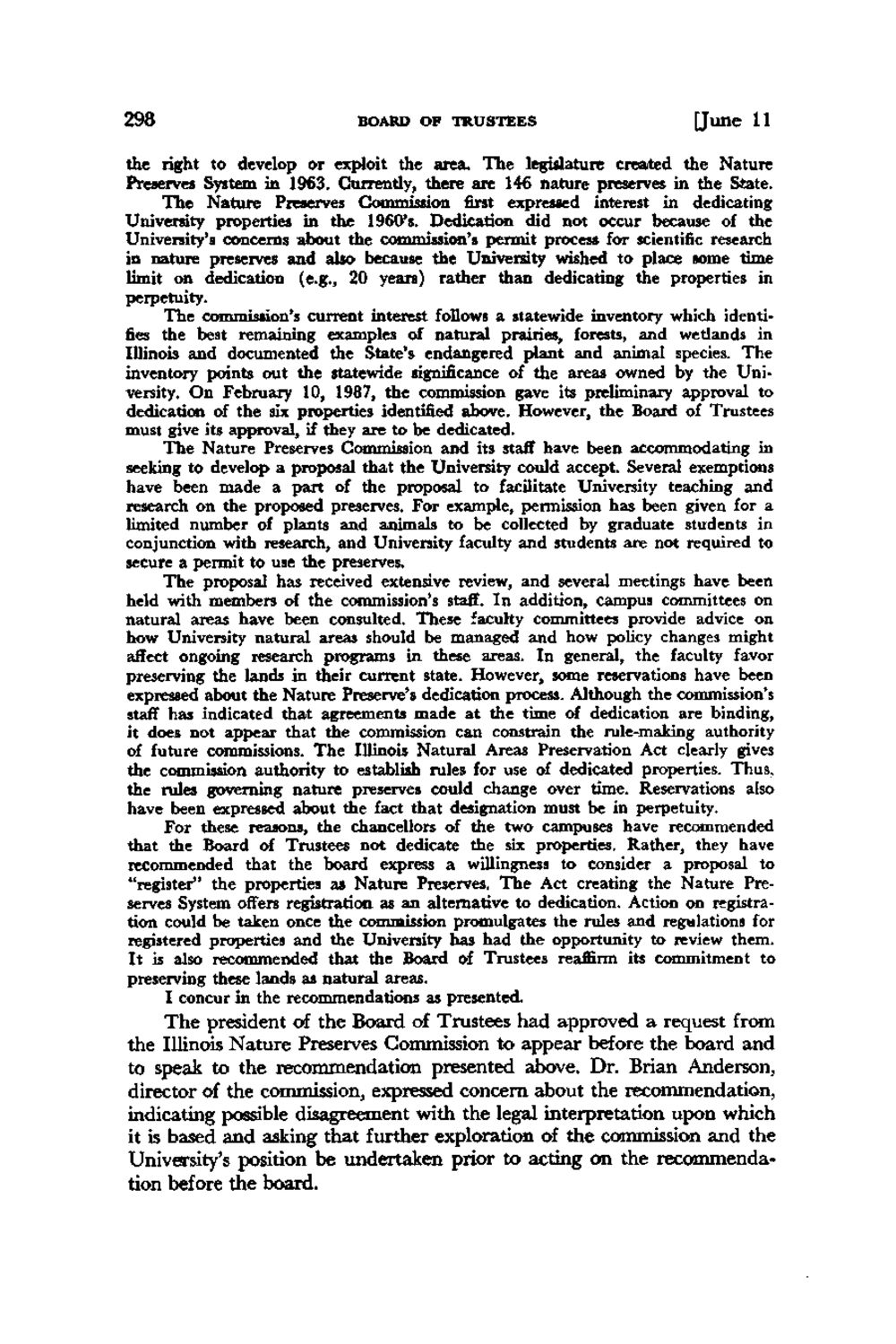| |
| |
Caption: Board of Trustees Minutes - 1988
This is a reduced-resolution page image for fast online browsing.

EXTRACTED TEXT FROM PAGE:
298 BOARD OF TRUSTEES [June 11 the right to develop or exploit the area. The legislature created the Nature Preserves System in 1963. Currently, there are 146 nature preserves in the State. The Nature Preserves Commission first expressed interest in dedicating University properties in the 1960's. Dedication did not occur because of the University's concerns about the commission's permit process for scientific research in nature preserves and also because the University wished to place some time limit on dedication (e.g., 20 years) rather than dedicating the properties in perpetuity. The commission's current interest follows a statewide inventory which identifies the best remaining examples of natural prairies, forests, and wetlands in Illinois and documented the State's endangered plant and animal species. The inventory points out the statewide significance of the areas owned by the University. On February 10, 1987, the commission gave its preliminary approval to dedication of the six properties identified above. However, the Board of Trustees must give its approval, if they are to be dedicated. The Nature Preserves Commission and its staff have been accommodating in seeking to develop a proposal that the University could accept. Several exemptions have been made a part of the proposal to facilitate University teaching and research on the proposed preserves. For example, permission has been given for a limited number of plants and animals to be collected by graduate students in conjunction with research, and University faculty and students are not required to secure a permit to use the preserves. The proposal has received extensive review, and several meetings have been held with members of the commission's staff. In addition, campus committees on natural areas have been consulted. These faculty committees provide advice on how University natural areas should be managed and how policy changes might affect ongoing research programs in these areas. In general, the faculty favor preserving the lands in their current state. However, some reservations have been expressed about the Nature Preserve's dedication process. Although the commission's staff has indicated that agreements made at the time of dedication are binding, it does not appear that the commission can constrain the rule-making authority of future commissions. The Illinois Natural Areas Preservation Act clearly gives the commission authority to establish rules for use of dedicated properties. Thus, the rules governing nature preserves could change over time. Reservations also have been expressed about the fact that designation must be in perpetuity. For these reasons, the chancellors of the two campuses have recommended that the Board of Trustees not dedicate the six properties. Rather, they have recommended that the board express a willingness to consider a proposal to "register" the properties as Nature Preserves. The Act creating the Nature Preserves System offers registration as an alternative to dedication. Action on registration could be taken once the commission promulgates the rules and regulations for registered properties and the University has had the opportunity to review them. It is also recommended that the Board of Trustees reaffirm its commitment to preserving these lands as natural areas. I concur in the recommendations as presented. T h e president of t h e B o a r d of Trustees h a d approved a request from t h e Illinois N a t u r e Preserves C o m m i s s i o n t o appear before t h e board a n d to speak to t h e r e c o m m e n d a t i o n presented above. D r . Brian Anderson, director of the commission, expressed c o n c e r n about the r e c o m m e n d a t i o n , indicating possible disagreement w i t h t h e legal interpretation u p o n w h i c h it is based a n d asking that further exploration of t h e commission and t h e University's position b e u n d e r t a k e n prior to a c t i n g o n t h e r e c o m m e n d a tion before t h e board.
| |